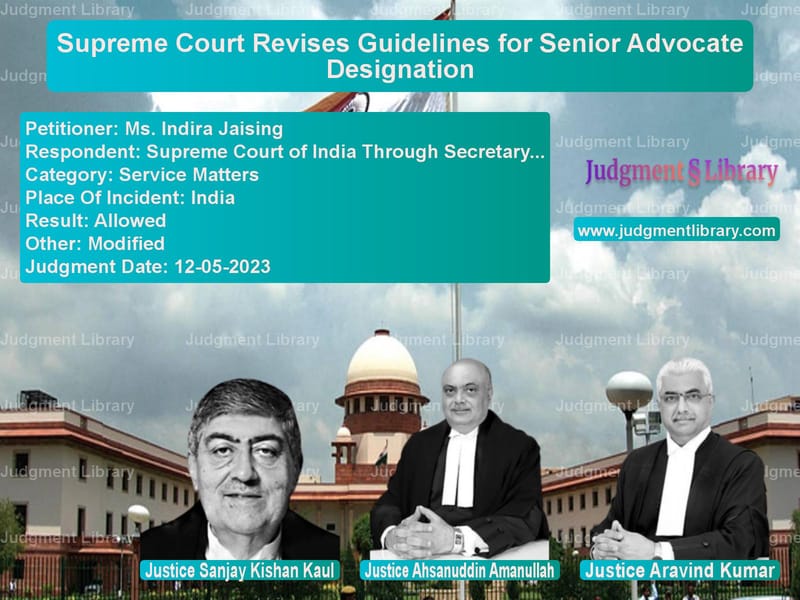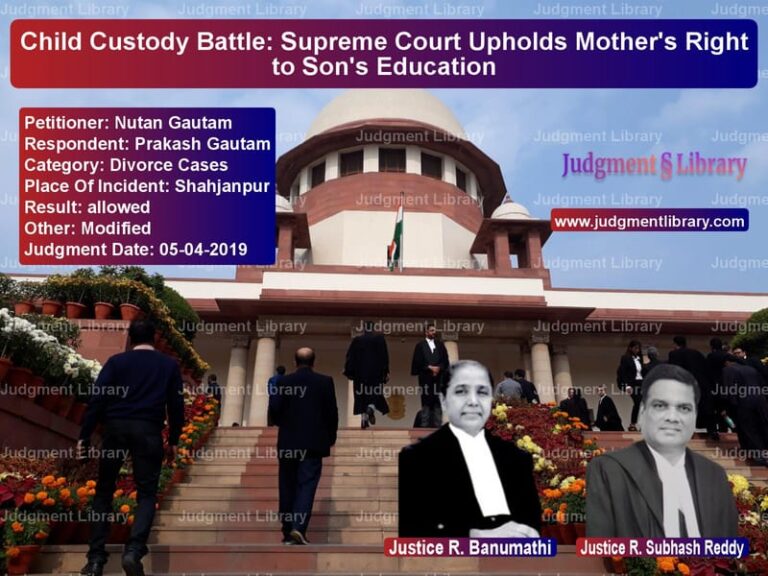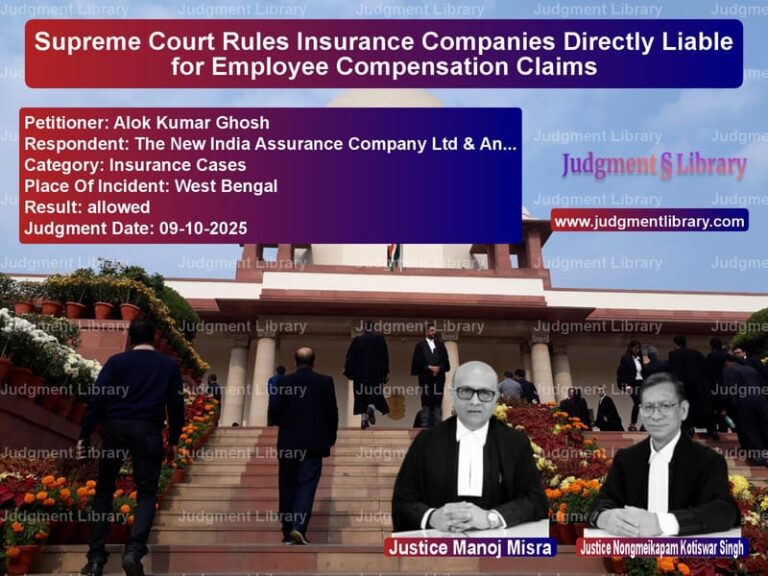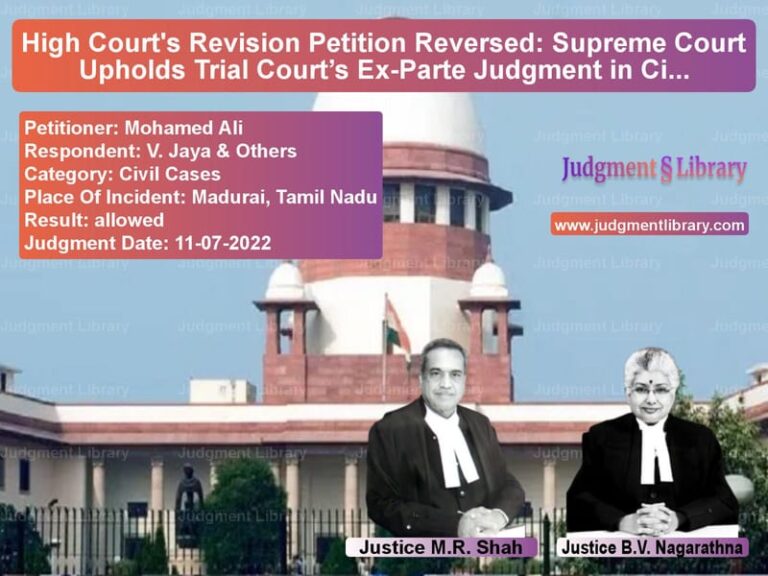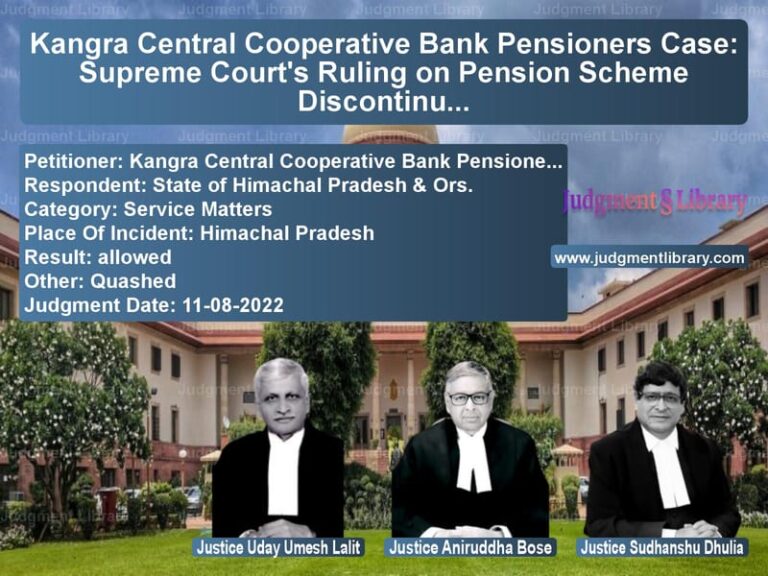Supreme Court Revises Guidelines for Senior Advocate Designation
The case of Ms. Indira Jaising v. Supreme Court of India Through Secretary General revolves around the system of designating Senior Advocates in India. The Supreme Court was called upon to examine whether the current process was transparent, fair, and based on merit. The petitioner sought modifications to the existing rules to make the designation of Senior Advocates more objective and structured.
This judgment is significant as it establishes new guidelines for conferring the title of Senior Advocate and ensures that the selection process is based on objective criteria rather than subjective opinions.
Background of the Case
Senior Advocates in India are a distinguished category of lawyers who are recognized for their ability, legal acumen, and contribution to the legal profession. The designation is governed by Section 16 of the Advocates Act, 1961, which classifies advocates into two categories: Senior Advocates and other Advocates.
Read also: https://judgmentlibrary.com/supreme-court-upholds-ibcs-workmen-dues-provision-in-liquidation-cases/
The system of appointing Senior Advocates was previously based on recommendations by the Supreme Court and High Courts. However, the petitioner, Ms. Indira Jaising, argued that the process lacked transparency, was not merit-based, and relied heavily on subjective assessments. She contended that the system needed an overhaul to ensure fairness and equal opportunity.
In 2017, the Supreme Court issued a landmark ruling that introduced a structured framework for evaluating candidates for Senior Advocate designation. The new case sought to further refine the system, ensuring it remained objective and effective.
Petitioner’s Arguments
The petitioner, Senior Advocate Indira Jaising, argued:
- The existing method of voting by secret ballot was arbitrary and often led to deserving candidates being overlooked.
- The process lacked an objective mechanism to assess an advocate’s expertise, integrity, and contribution to legal jurisprudence.
- There was a need for a structured point-based system that considered various factors such as judgments argued, legal publications, and contributions to pro bono work.
- The Permanent Committee tasked with evaluating applications should have more defined guidelines to assess merit and suitability.
Respondent’s Arguments
The Supreme Court, as the respondent, defended the existing process but acknowledged the need for improvements. The key counterarguments were:
- The power to designate Senior Advocates is discretionary and should not be restricted by rigid rules.
- While transparency is necessary, a completely mechanical system may not always recognize true legal merit.
- The existing process was already reformed in 2017, and any further changes should be implemented cautiously to avoid unintended consequences.
Supreme Court Judgment
The case was heard by Justice Sanjay Kishan Kaul, Justice Ahsanuddin Amanullah, and Justice Aravind Kumar. The Court upheld the need for further refinements in the process and introduced the following key changes:
1. Elimination of Secret Ballot
The Court ruled that the method of voting by secret ballot should be an exception rather than the rule. It stated:
“The elaborate procedure carried out by the Permanent Committee would serve no purpose if the ultimate decision is taken by secret ballot.”
Going forward, secret ballots will only be used in exceptional cases where there are strong reasons to justify them.
2. Structured Points-Based Evaluation
The Court reaffirmed the need for a structured assessment process and made modifications to the points system:
- Years of Practice: Advocates with 10-20 years of practice will receive up to 20 points, with an incremental point system instead of a fixed score.
- Judgments and Legal Contributions: The weightage for reported and unreported judgments, legal arguments, and domain expertise was increased to 50 points.
- Publications and Teaching: The category for academic contributions was retained but reduced from 15 points to 5 points.
- Personality Test and Interaction: The assessment based on personal interviews was retained at 25 points.
3. Encouragement for Specialized Advocates
The Court acknowledged that many advocates specialize in niche areas such as arbitration, competition law, and white-collar crime. It ruled:
“Specialized lawyers with domain expertise should not be deprived of the opportunity for Senior Advocate designation due to fewer appearances in constitutional matters.”
As a result, consideration will be given to those practicing in tribunals and regulatory bodies.
4. Diversity and Inclusion
The Court stressed the need to promote diversity and recognize first-generation lawyers and female advocates:
“Due consideration should be given in the interest of diversity, particularly with respect to gender and first-generation lawyers.”
This ensures that the designation process is inclusive and representative of all sections of the legal fraternity.
5. Frequency of Senior Advocate Designations
The Court ruled that the designation process should be conducted at least once a year to prevent a backlog of applications.
Final Verdict
The Supreme Court allowed the plea for modifications and ruled:
- The secret ballot system should only be used in exceptional cases.
- A revised points-based system should be implemented for greater transparency.
- Specialized advocates should be given due consideration.
- Diversity and representation should be key factors in evaluating candidates.
- The designation process should be conducted annually to ensure timely recognition of deserving advocates.
Conclusion
This judgment is a landmark ruling that strengthens the framework for Senior Advocate designation in India. By introducing a more transparent and structured process, the Supreme Court has ensured that merit, legal contributions, and diversity remain at the core of the designation system. The ruling sets a precedent for continuous improvement in legal professional recognition and aims to make the designation process more equitable and inclusive.
Petitioner Name: Ms. Indira Jaising.Respondent Name: Supreme Court of India Through Secretary General.Judgment By: Justice Sanjay Kishan Kaul, Justice Ahsanuddin Amanullah, Justice Aravind Kumar.Place Of Incident: India.Judgment Date: 12-05-2023.
Don’t miss out on the full details! Download the complete judgment in PDF format below and gain valuable insights instantly!
Download Judgment: ms.-indira-jaising-vs-supreme-court-of-ind-supreme-court-of-india-judgment-dated-12-05-2023.pdf
Directly Download Judgment: Directly download this Judgment
See all petitions in Recruitment Policies
See all petitions in Public Sector Employees
See all petitions in Employment Disputes
See all petitions in Judgment by Sanjay Kishan Kaul
See all petitions in Judgment by Ahsanuddin Amanullah
See all petitions in Judgment by Aravind Kumar
See all petitions in allowed
See all petitions in Modified
See all petitions in supreme court of India judgments May 2023
See all petitions in 2023 judgments
See all posts in Service Matters Category
See all allowed petitions in Service Matters Category
See all Dismissed petitions in Service Matters Category
See all partially allowed petitions in Service Matters Category

